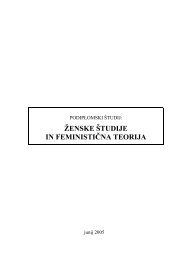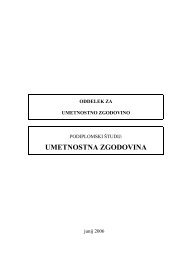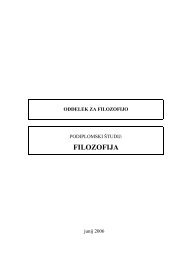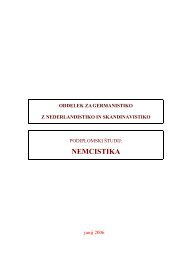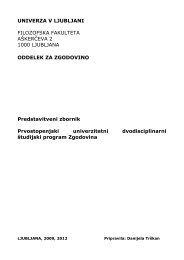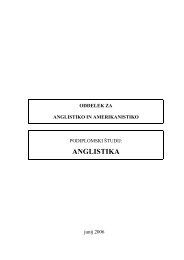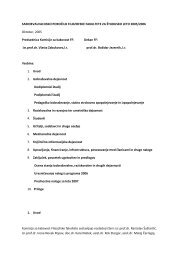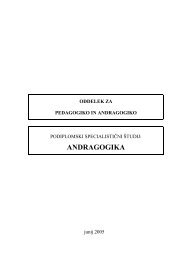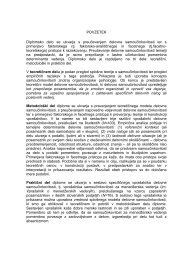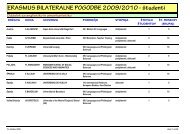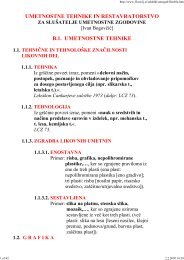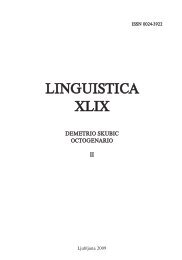B_solo_zgibanke male new_1 - Filozofska fakulteta
B_solo_zgibanke male new_1 - Filozofska fakulteta
B_solo_zgibanke male new_1 - Filozofska fakulteta
Create successful ePaper yourself
Turn your PDF publications into a flip-book with our unique Google optimized e-Paper software.
MiMetiC DiSCOURSe PReSeNtatiON<br />
the unmarked rendition of mimetic discourse applies to the presentation of direct<br />
speech produced by the characters. in such sections of a fictional text, the narrator<br />
is, according to Leech and Short (1981: 324), “apparently in partial control of<br />
report.” Direct speech is identifiable through reporting clauses and the use of<br />
quotation marks. a further type of mimetic discourse presentation is found in free<br />
direct speech (Quirk et al. 1985, Leech and Short 1981), or, rather, free direct<br />
discourse (McHale 1978, Mozetič 2000a, b), where, according to Leech and Short<br />
(1981: 324), the narrator is “apparently not in control of report at all.” Free direct<br />
discourse differs from direct discourse in omission of the quotation marks, the<br />
reporting clause, however, may be present, yet it functions as an embedded sentence<br />
in medial position, or appearing in final position. Free direct discourse is easily<br />
discovered in the past-time sphere narratives with the omniscient narrator or the<br />
third-person narrator, as the character whose free direct discourse is presented can<br />
be identified through the first-person narration in the present time-sphere (with an<br />
ensuing confluence of narrative and story time) and, especially, through the<br />
ideolectal features of the character’s voice.<br />
in two further types of mimetic discourse presentation, ie. indirect discourse and<br />
free indirect discourse, the narrator is “apparently in partial control of report” (ibid.).<br />
these narrative forms are sources of systemic differences in the temporal placement<br />
of verb actions in english and Slovene. in english, one of the most striking<br />
differences between indirect discourse and free indirect discourse on the one hand<br />
and free direct discourse on the other is in the use of different temporal spheres. in<br />
past time-sphere narration, verb actions in indirect discourse and free indirect<br />
discourse are situated within the diegetic past time-sphere, and hence help to<br />
produce the diegetic structural unity of narrative time.<br />
in Slovene, however, the verb propositions in indirect discourse and free indirect<br />
discourse retain the mimetic temporal sphere. the default tenses, not the person<br />
though, are identical with the tenses originally employed by the character. in order to<br />
express simultaneity, the default sedanjik (the present tense) is used, anteriority by<br />
the default preteklik (the past tense), and posteriority by the default prihodnjik (the<br />
future tense) or the sedanjik (toporišič 1991: 330–334). the default tense system<br />
creates a temporal intrusion into the diegetic past time-sphere, especially noticeable<br />
with verb propositions spanning several sentences, bringing the narration closer to<br />
the now-and-here position of the character, thus delegating more power to the latter.<br />
the basic narrative difference between english and Slovene indirect discourse and<br />
free indirect discourse is in the narrative control exercised either by the narrator or the<br />
character. the extent to which this systemic difference can be perceived as such heavily<br />
depends on the mind-style, ie. “the world-view of an author, or a narrator, or a<br />
character, constituted by the ideational structure of the text” (Fowler 1996: 214).<br />
Mind-style is primarily characterized by lexico-grammatical features of “vocabulary,<br />
transitivity, and certain syntactic structures” (ibid.). Simple or plain syntax is associated<br />
with the straightforward SvO order, with clauses and sentences “organized by parataxis<br />
229



